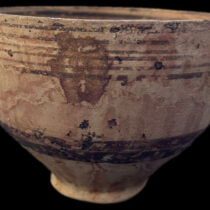Remarkable archaeological discoveries have been made in the ancient city of Uzuncaburç, located in Mersin, southern Turkey. Excavations have uncovered five iron weights shaped like Greek letters and a balance scale, all estimated to be about 1,600 years old.
Situated 30 kilometers north of Silifke, the city of Uzuncaburç is one of the best-preserved examples of Hellenistic architecture in the region. The excavation project is a joint effort by Turkey’s Ministry of Culture and Tourism and Mersin University (MEÜ), under the “Heritage for the Future” initiative. The work is led by Professor Ümit Aydınoğlu of MEÜ’s Archaeology Department.
The findings emerged during digs along one of the city’s two colonnaded streets, central avenues in the layout of Uzuncaburç. The unearthed iron weights, bearing letters from the ancient Greek alphabet, are believed to have been part of a standard system of measurement used during Late Antiquity — specifically the “litra” system. The weights range from half a litra to 5 litras, roughly equivalent to 150 grams to 1.5 kilograms.
Professor Aydınoğlu highlighted that this is the first complete set of such a weighing system found in the area. He noted that the use of lettered symbols on the weights likely represents a localized system or a common trade convention of the time.
The team also discovered numerous shops, coins, and cutting tools in the area, offering deeper insight into the city’s commercial activity between the 4th and 7th centuries AD.
Beyond excavation, restoration and conservation efforts are underway. Informational signs and walking paths have already been installed, and some ancient shops are planned to be restored. Aydınoğlu expressed hope that in the coming years, Uzuncaburç will become a model for archaeological tourism villages in Turkey.





